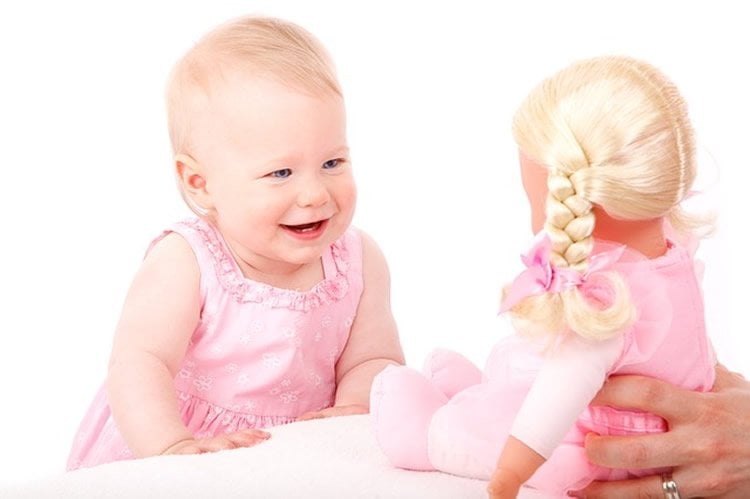Infants’ ability to relate words to objects at 12 months linked to language skills at 18 months.
At 12 months old, your infant’s ability to group objects according to the names associated with them — as opposed to their appearance alone — offers a glimpse into how his or her vocabulary will develop by the time they are 18 months, Northwestern University researchers have found.
The research, by Brock Ferguson, Melanie Havy and leading developmental scientist Sandra Waxman, in the psychology department in the Weinberg College of Arts and Sciences, will appear in an upcoming issue of the open access journal Frontiers in Psychology.
“Our findings offer one piece of the very large puzzle that is vocabulary development,” said Ferguson, lead author of the study and a doctoral candidate in cognitive psychology.
“This is a big first step toward using these cognitive tasks to identify infants at risk for language delays.”
The study examined whether individual differences in the precision of 12-month-olds’ ability to link language and object categories was related to both their present and future vocabulary growth.
Ferguson offers a real-world analogy to the situation researchers create in the lab to measure infants’ use of names as a guide to object categorization.
“Imagine you are taking your baby for a visit to the primate house at the zoo,” he said. “There are gorillas, chimpanzees and monkeys in the primate house. Although all the primates look fairly similar, but we know them to be different because we refer to them by different names.”
In that hypothetical scenario, 12-month-old babies who conclude that all of the primates belong in the same category, despite the fact that mom has referred to each by a different name, tend to have a less developed vocabulary, according to Ferguson’s findings.

“In out study, babies who went ahead and grouped objects together even though the researchers had labeled them with distinct names were later found to know fewer words,” Ferguson said.
Cognitive development is broadly defined as the process by which babies and young children learn about the world around them, and includes the acquisition of problem solving, memory, perception and, of course, language.
Working at the Project for Child Development, Waxman and her colleagues have already shown that talking to young children, even before they can speak, strengthens their language and cognitive abilities.
“This new finding is the first to link infants’ performance on our cognitive task to their progress in learning new words,” said Sandra Waxman, the Louis W. Menk Chair in Psychology, a professor of cognitive psychology and a faculty fellow in the University’s Institute for Policy Research.
Facts:
- Researchers link babies’ performance on cognitive tasks to later learning progress
- Study underscores importance of talking to your baby well before they can talk back
- Findings may eventually contribute to reducing “vocabulary gap”
Source: Erin Meyer – Northwestern University
Image Source: The image is in the public domain
Original Research: Full open access research for “The precision of 12-month-old infants’ link between language and categorization predicts vocabulary size at 12 and 18 months” by Brock Ferguson, Mélanie Havy and Sandra R. Waxman in Frontiers in Psychology. Published online August 31 2015 doi:10.3389/fpsyg.2015.01319
Abstract
The precision of 12-month-old infants’ link between language and categorization predicts vocabulary size at 12 and 18 months
Infants’ initially broad links between language and object categories are increasingly tuned, becoming more precise by the end of their first year. In a longitudinal study, we asked whether individual differences in the precision of infants’ links at 12 months of age are related to vocabulary development. We found that, at 12 months, infants who had already established a precise link between labels and categories understood more words than those whose link was still broad. Six months later, this advantage held: At 18 months, infants who had demonstrated a precise link at 12 months knew and produced more words than did infants who had demonstrated a broad link at 12 months. We conclude that individual differences in the precision of 12-month-old infants’ links between language and categories provide a reliable window into their vocabulary development. We consider several causal explanations of this relation.
“The precision of 12-month-old infants’ link between language and categorization predicts vocabulary size at 12 and 18 months” by Brock Ferguson, Mélanie Havy and Sandra R. Waxman in Frontiers in Psychology. Published online August 31 2015 doi:10.3389/fpsyg.2015.01319






